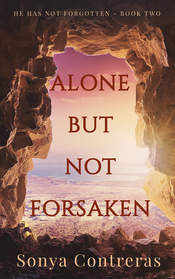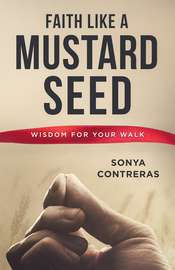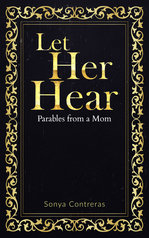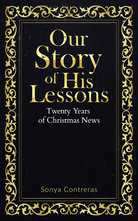- Home
- Index
-
My Books
- Book List
- Writing/Reading Articles Listing
-
My Short Stories
- What God Lost
- What God Lost — Part 2
- When Hope Was Lost
- A Battle in the Heavens
- To Live Forever
- Finding Peace
- Empty Hands
- From Fire and Thunder to Love and Submission
- The Coming One
- Forgiveness Made Possible
- The Innkeeper's Wife
- Do You Have The Right Words?
- The Lamb of God As Told by a Scribe
- What Love Is This?
- When Heaven Came Down
- Family
- Faith
What Should Fiction Do?
 1. A book should teach truth.
1. A book should teach truth.
Emotions tied to values are harder to discern and to separate than when the same values are presented without an emotional base. Books should present an accurate view of who we are.
Fiction is telling a made-up story but still showing who we really are. The values presented are what is true.
2. Books should show beauty.
Sin leaves the world tainted and ugly. A book should take us away from the ugliness to give a perspective of something grander.
That does not mean that it does not mention wrong. Much of real life is battling wrong and desiring right to prevail. It is a conflict. But there is tendency of modern fiction to delve into the wrong, to lead the reader down paths of temptation and sin to create a problem that is so explicit that he does not have to imagine the wrong, he is doing the wrong, just by reading the book. These books make readers sin.
Many are quick to say that they are just presenting the world as it really is. Must we lead the reader to sin in order to present reality? Should the reader be led into the mire, experience the sin before he is given a way out? We all know what it is to sin. We do not need to experience every sin, to empathize with the character in that particular sin.
Reading should lead the reader to desire beauty, to see it as possible, to strive for it.
3. Books should offer hope.
Books are an escape from the problems of life, to a world where the problems are neatly solved at the close of the book. The uncertainties are rectified. That does not mean that the book must end happily-ever-after. Shakespeare exemplifies the tragic endings. But the reader must not be given a view of insurmountable problems only to be left with them unresolved.
Many children who come from turbulent home situations have found solace in the covers of a book. They can read and know that there is safety and resolved conflict. The characters have problems, but they can be solved.
There is a greater trend in YA books to portray home situations of characters so engrained in the mire of evil and wrong that there is no real way of solving the problem. A fairy or wizard must aid them in their solution. This sets youth up to think that they must delve into magic and powers of evil in order to solve their own problems. The books lead them further into evil. Or teach them to live in despair because they cannot realistically solve the problem. These books do not give hope. They are bringing our future children to a world of despair.
By offering an escape from the problems of real life, the author provides the reader with tools that enables him to return to real life with a renewed sense of hope, an ability to see the real problems with a hope of solution.
4. Books should present a challenge.
No book should be dull and boring. Not only does that discourage thinking, but also it hinders children from learning to read. What incentive is there to turn the page, when the reader does not care to know what happened? He isn’t engaged in the action. He doesn’t feel for the character. He does not wish to know how to solve the problem. He must be able to desire to fight for the solution. The cost is worth it.
5. Books need to inspire.
This is why they must be books of beauty. If the cause isn’t worth it, then who cares if the solution is reached? Strive for a worthwhile goal. Fight for a cause worth dying for. These help sacrifice for a need beyond us. The selfishness of the world is put away for a brief moment in time. Choosing to think beyond our own needs allows us to give to others. The book is finished and the reader knows that he can give without getting.
6. Books motivate action.
They call to duty. They demand the reader to be a man. They show that stretching a bit more will enable the prize to be reached. The character could solve the problem, so can I.
7. Books are a gateway to the future.
By giving the reader beauty, hope and a challenge, they can leave the book at the close of the cover and attempt again the problems of real life. They can see beauty in spite of the sin. They can renew their hope of solution to their own problems. They can be motivated to try again because the cause is good.
By doing this, they can change their world, one book at a time.
Isn’t that what Philippians 4:8 commands: “Whatever is true, whatever is honorable, whatever is right, whatever is pure, whatever is lovely, whatever is of good repute, if there is any excellence and if anything worthy of praise, dwell on these things.”
Isn’t that what books should do, point us to the One Who can change the world, one person at a time?
Did you enjoy this article? Share with your friends!
No comments found
Reading
Find more articles about reading here:
Why Read Fiction?
The Danger of The Wrong Story
Using Stories To Teach Lessons
Reading Chair Worth Using
What Do You Read When You Need Refueled?
Worth Reading
Home Furnishings
The Home Library: A Source of Peace, Calm and Security
My Utmost for His Highest
Reading: It's for Your Children
What Kind of Library Are You Building?
Book List: What Every Boy Wants To Read
The Bible with a Heart
Stressed? Read a Book
Books that Influence
What Is a Good Book?
Escape for a Moment of Time
What Is Fiction Good for?
The Case for Good Taste in Children's Books
What Should Fiction Do?
What Does a 5-Star Book Mean?
Don't Judge a Book by Its Cover
Treasures To Explore
Writing Articles
Find more articles here:
Why I Write
The Face that Shows
Do You Believe in Yourself?
The Publishing Process
Calling All Reviewers!
How Can You Help?

Author of Biblical fiction, married to my best friend, and challenged by eight sons’ growing pains as I write about what matters.
Receive weekly articles by giving your email address below:








